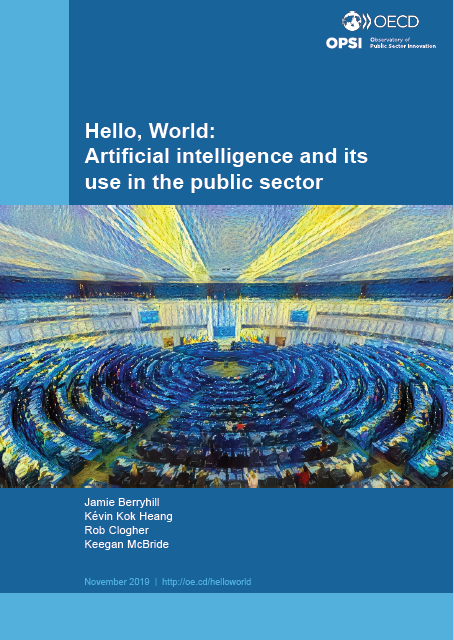Hello, World: Artificial Intelligence and its use in the public sector

Overview
Artificial Intelligence (AI) is an area of research and technology application that can have a significant impact on public policies and services in many ways.
Governments can use AI to design better policies and make better decisions, improve communication and engagement with citizens and residents, and improve the speed and quality of public services. While the potential benefits of AI are significant, attaining them is not an easy task. Government use of AI trails that of the private sector; the field is complex and has a steep learning curve; and the purpose of, and context within, government are unique and present a number of challenges. To help governments learn about and explore AI in an effective and ethical way, this paper includes guidance on:
- Providing support and clear direction and create space for flexibility and experimentation
- Determine whether AI is the best solution for a given problem
- Providing for multi-disciplinary, diverse, and inclusive perspectives
- Developing a trustworthy, fair, and accountable approach to using AI
- Securing ethical collection of, access to, and use of quality data
- Ensure government organisations have access to adequate funding, capability, capacity, & infrastructure
- Recognising the potentially significant shifts that AI might bring in the future.
GitHub for AI collaboration
GitHub is a popular web platform that serves as both a code repository and a social network. Users can host and share computer code publicly in code repositories. The code is often licensed as free and open source software (FOSS), which enables others to freely download and apply the source code to their own work, and to make contributions to others users’ projects. The platform also allows for collaborative development whereby multiple users make changes to improve code, with contributions tracked through Git, a version control system. For instance, the United States government conducted a Federal AI Personal Assistant Pilot in 2017 for the effective, efficient and accountable introduction of available intelligent personal assistants (e.g. Amazon Alexa, Google Assistant, Microsoft Cortana, Facebook Messenger’s chatbots) into government programmes. GitHub was used as a convening tool and a collaboration space for the pilot.
???????? United States


Hello, World: Artificial Intelligence and its use in the public sector
Published on 21 November 2019.
